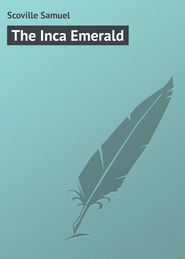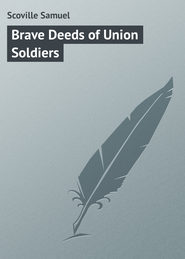По всем вопросам обращайтесь на: info@litportal.ru
(©) 2003-2024.
✖
Brave Deeds of Union Soldiers
Настройки чтения
Размер шрифта
Высота строк
Поля
CHAPTER IV
BOY HEROES
One doesn't have to be big, or old, or strong to be brave. But one does have to believe in something so much and so hard that nothing else counts, even death. An idea that is so big that everything else seems small is called an ideal. It is easy for a boy with an ideal to be brave. Cassabianca, the boy who stayed on the burning ship because he had been ordered to wait there by his dead father, had made obedience his ideal. The boy of Holland who found a leak in the dyke which could only be stopped by his hand, and who stayed through the long night and saved his village but lost his right hand had learned this great ideal of self-sacrifice. The shepherd boy who saved his sheep from a lion and a bear and who afterward was the only one who dared enter the fatal valley and meet the fierce giant-warrior had as his ideal faith. He believed so strongly that he was doing God's will that he shared God's strength.
In the great war between slavery and freedom which swept like fire over the country, boys learned the ideals for which their fathers fought. They learned to believe so entirely in freedom that there was no room left for fear. Many of them went to the war as drummer boys, the only way in which boys could enlist. One of these was Johnny McLaughlin of the Tenth Indiana. Johnny lived at a place called Lafayette and was not quite eleven years old. From the minute that the war broke out he thought of nothing but what he could do for his country and for freedom. Other boys played at drilling and marching, but this was not enough for him. He made inquiries and found that if he could learn to drum, there was a chance that he might be allowed to enlist. He said nothing at first to his father and mother about his plans, but saved all his spending-money and worked every holiday in order to get enough to buy a drum. Times were hard, however. There was little money for men, much less for boys, and after Johnny had worked for over two months, he had saved exactly two dollars. In the village was a drummer who had been sent home to recover from his wounds and to him Johnny went one day to ask how much more he would have to save before he could buy a drum. The man told him that a good drum would cost him at least ten dollars. Johnny sighed and turned away very much discouraged.
"Why don't you play something else?" said the man. "You can get more fun out of ten dollars than buying a drum with it."
"I don't want it to play with," said Johnny. "I want to learn to drum so that I can enlist."
At first the man laughed at the boy – he seemed so little, but when he found that Johnny had made up his mind to do his share for his country in the great fight, Donaldson, as he was named, became serious.
"I tell you what I'll do," he said at last. "If you are really in earnest about learning to drum, I'll give you lessons myself, for," said he modestly, "I was the best drummer in my regiment. If you can learn and they will take you, I'll give you the old drum. I'll send it to the front even if I can't go myself."
This was enough for Johnny. Morning, noon and night he was with his friend Donaldson and it was a wonder that the drum-head was not worn out long before he learned. Learn he did, however, and in a few months there was not a roll or a call which he could not play. One morning as the school-bell was ringing, Johnny presented himself to his parents with the big drum around his neck looking nearly as large as he was.
"I'm going to enlist," he said simply.
At first his father and mother, like Donaldson, were inclined to laugh at him, he was such a little boy, but Johnny was in earnest and a boy who is in earnest always gets what he wants. A few days later found him a drummer for the Tenth Indiana and as he led the regiment, beating the long roll, Johnny was the proudest boy that had ever come out of Indiana. He had his first taste of fire at Fort Donelson and afterward at the bloody battle of Shiloh. Johnny drummed until the terrible drumming of the muskets drowned out even his loud notes. Then he laid down his sticks, carefully hid his drum, took a musket and cartridge box from off one of the dead soldiers and ran on with his regiment and fought in the front with the bravest of them all. He had a quick eye and it was not long before he could shoot as accurately as any man there.
It was just after Shiloh that Johnny had a narrow escape from being captured. Wanting to try everything, he obtained permission to do picket duty at night although this work was not required of drummer boys. As he had shown himself such a cool and ready fighter, his colonel felt that he was entirely able to do this duty and one dark night put him on picket. His post was some distance away from the camp. Just at dawn he was suddenly rushed by a party of rebel cavalry. As they burst out of the bushes Johnny fired his carbine at the first one, dropping him, and ran across an open field about fifty yards wide. At the other side was an old, rotten, log fence and beyond that a mass of briers and underbrush where he was sure the horses could not follow. Fortunately for him the rains had made the field a mass of mud. There his lightness gave him the advantage, for the horses slumped through at every step. The rebels fired constantly at him as they rode with their pistols. One ball went through his hat, another clear through his cartridge box and lodged in his coat, fortunately without exploding any of the cartridges. Beyond the middle of the field the ground was drier and the horsemen commenced to gain on him, but he reached the fence well ahead and with one jump landed on the top. The rotten rails gave way underneath him and he plunged headlong over into the brush, right on the back of a big sleeping wild pig who had rooted out a lair at this place. The pig jumped up grunting and crashed through the underbrush and Johnny heard his pursuers smashing through the broken fence not a rod away. He curled up into the round hole which the pig had left, drew down the bushes over his head and lay perfectly quiet. The horsemen, hearing the rustling of leaves and the smashing of branches as the pig dashed off down a pathway, followed after at full gallop and were out of sight in a minute. As soon as the sound of their galloping had died away, Johnny crawled cautiously out of his hole and made the best of his way back to camp. The next day some of the rebel cavalry were taken prisoners and Johnny recognized one of them as the leader of the squad which had so nearly caught him. The prisoner recognized the boy at the same time and they both grinned cheerfully at each other.
"Did you catch that pig yesterday?" finally said Johnny.
"We did that," retorted the prisoner, "but it wasn't the one we were after."
Johnny had always been able to ride the most spirited horses on the farm and after Shiloh he asked to be transferred from the infantry to Colonel Jacob's Kentucky Cavalry. There he attracted the attention of the colonel so that the latter gave him one of the best horses in the regiment and a place in the Fighting First, as the best-mounted company was called, which the colonel always led personally in every charge. In this company Johnny was taught how to handle a sabre. The regular sabre was too heavy for him, but Colonel Jacob had one light, short one specially made which Johnny learned to handle like a flash. A German sergeant, who had been a great fencer on the Continent, taught him all that he knew and before long Johnny was an expert in tricks of fence which stood him in good stead later on. One in special he so perfected that it was never parried. Instead of striking down with the sabre as is generally done, Johnny learned a whirling, flashing upper-cut which came so rapidly that generally an opponent could not even see much less parry it. He was also armed with the regulation revolver and a light carbine instead of the heavy revolving rifle used by the rest of the troop. At Perryville he fought his first battle with his new regiment. In the charge he stuck close to Colonel Jacob and received a ball through his left leg above the knee. Fortunately it did not break any bone and Johnny tore a strip off his shirt, bandaged the hole and went on with the fight. While he was doing this, the greater part of the regiment passed on and when Johnny started to join his colonel, he could not find him. He rode like the wind over the field and soon behind a little patch of woods saw Colonel Jacobs with only six or seven men, the rest having been scattered in the fight. Johnny spurred his horse over to him and the colonel was delighted to be joined by his little body-guard. As they were riding along to rejoin the rest of the regiment, from out a clump of bushes a squad of fifty men led by a Confederate major dashed out calling on them to surrender. Colonel Jacob hesitated, for some of his men were wounded and the odds seemed too great for a fight. Before he had time to answer, Johnny slipped in front of him, drew out his revolver and fired directly into the Confederate officer's face, killing him instantly and then drawing his sabre dashed into the ranks of the enemy. The first man he met was a big fellow whose bare, brawny arm and blood-stained sabre proved him a master with his weapon. Johnny never gave him a chance to strike. At the whirl of his light sabre his opponent instinctively raised his weapon in the ordinary parry of a down-blow and the point of Johnny's sabre caught him under the chin and toppled him off his horse. The Union men gave a cheer, followed their little leader, breaking clear through the demoralized Confederates and joined their command at the other side of the field.
A few weeks later they had a skirmish with the troop of John Morgan, the most dreaded cavalry leader and fighter in all the South. Johnny, as usual, was in the front of the charge and had just cut at one man when another aimed a tremendous blow at his head in passing. There was just time for Johnny to raise the pommel of his sabre to save his head, but the deflected blow caught him on the leg and he fell from the horse with blood spurting out of his other leg this time. He lay perfectly quiet, but another rebel had seen him fall and spurring forward, caught him by the collar, saying:
"We'll keep this little Yankee in a cage to show the children."
Johnny did not approve of this cage-idea and although there was no room to use the sabre, managed to work his left hand back into his belt, draw his revolver and shoot his captor dead. In another minute his company came riding back and he was whirled up behind his colonel and rode back of him to safety. This last wound proved to be a serious one and he was sent back to Indiana on a furlough to give it time to heal. On the way back he was stopped by a provost guard and asked for his pass.
"My colonel forgot to give me any passes," said Johnny, "but here are two that the rebels gave me," showing his bandaged legs, and the guard agreed with him that this was pass enough for any one. As his wound refused to heal, against his wishes he was discharged and once more returned home. He then tried to enlist again, but each time he was turned down because of the unhealed wound. Finally, Johnny traveled clear to Washington and had a personal talk with President Lincoln and explained to him that his wound would never heal except in active service. His arguments had such force with the President that a special order was made for his enlistment and he fought through the whole war and afterward joined the regular army.
The littlest hero of the war was Eddie Lee. Shortly before the battle of Wilson's Creek, one of the Iowa regiments was ordered to join General Lyon in his march to the creek. The drummer of one of the companies was taken sick and had to go to the hospital. The day before the regiment was to march a negro came to the camp and told the captain that he knew of a drummer who would like to enlist. The captain told him to bring the boy in the next morning and if he could drum well he would give him a chance. The next day during the beating of the reveille, a woman in deep mourning came in leading by the hand a little chap about as big as a penny and apparently not more than five or six years old. She inquired for the captain and when the latter came out, told him that she had brought him a drummer boy.
"Drummer boy," said the captain; "why, madam, we don't take them as small as this. That boy hasn't been out of the cradle many months."
"He has been out long enough," spoke up the boy, "to play any tune you want."
His mother then told the captain that she was from East Tennessee where her husband had been killed by the rebels and all her property destroyed and she must find a place for the boy.
"Well, well," said the captain, impatiently, "Sergeant, bring the drum and order our fifer to come forward."
In a few moments the drum was produced and the fifer, a tall, good-natured fellow over six feet in height, made his appearance.
"Here's your new side-partner, Bill," said the captain.
Bill stooped down, and down and down until his hands rested on his ankles and peered into the boy's face carefully.
"Why, captain," said he, "he ain't much taller than the drum."
"Little man, can you really drum?" he asked.
"Yes, sir," said the boy. "I used to drum for Captain Hill in Tennessee. I am nearly ten years old and I want the place."
The fifer straightened himself up slowly, placed his fife at his mouth and commenced to play "The Flowers of the Forest," one of the most difficult pieces to follow on the drum. The little chap accompanied him without a mistake and when he had finished began a perfect fusillade of rolls and calls and rallies which came so fast that they sounded like a volley of musketry. When the noise had finally died out, the captain turned to his mother and said:
"Madam, I'll take that boy. He isn't much bigger than a minute but he certainly can drum."
The woman kissed the boy and nearly broke down.
"You'll surely bring him back to me, captain," she said.
"Sure," said the captain; "we'll all be discharged in about six weeks."
An hour later Eddie was marching at the head of the Iowa First playing "The Girl I Left Behind Me" as it had never been played before. He and Bill, the fifer, became great chums and Eddie was the favorite of the whole regiment. Whenever anything especially nice was brought back by the foraging parties, Eddie always had his share and the captain said that he was in far more danger from watermelons than he was from bullets. On heavy marches the fifer would carry him on his back, drum and all, and this was always Eddie's position in fording the numerous streams.
At the Battle of Wilson's Creek the Iowa regiment and a part of an Illinois regiment were ordered to clear out a flanking party concealed in a ravine upon the left of the Union forces. The ravine was a deep, long one with high trees and heavy underbrush and dark even at noontime. The Union regiments marched down and there was a dreadful hand-to-hand fight in the brush in the semi-twilight. Men became separated from each other and as in the great battle between David and Absalom, the wood devoured more people that day than the sword devoured. The fight was going against the Union men when suddenly a Union battery wheeled into line on a near-by hill and poured a rain of grape and canister into the Confederates which drove them out in short order. Later on the word was passed through the Union Army that General Lyon had been killed and soon after came the order to fall back upon Springfield. The Iowa regiment and two companies of a Missouri regiment were ordered to camp on the battle-field and act as a rear guard to cover a retreat. When the men came together that night there was no drummer boy. In the hurry and rush of hand-to-hand fighting, Eddie had become separated from Bill and although the latter raged back and forth through the brush like an angry bull, never a trace of his little comrade could he find. That night the sentries stood guard over the abandoned field and along the edge of the dark ravine now filled with the dead of both sides. It was a wild, desolate country and as the men passed back and forth over the stricken field, they could hear the long, mournful, wailing howl of the wolves which were brought by the smell of blood from the wilderness to the battle-field from miles around. That night poor Bill was unable to sleep and moaned and tossed on his blanket and said for the thousandth time:
"If only I had kept closer to the little chap."
Suddenly he sprang to his feet and roused the sleeping men all around him.
"Don't you hear a drum?" said he.
They all listened sadly, but could hear nothing.
"Lie down, Bill," said one of them. "Eddie's gone. We all did the best we could."
"He's down there in the dark," cried poor Bill, "drumming for help, and I must go to him."
The others tried to hold him back for it was impossible to see a foot through the tangled ravine at night and moreover the orders were strict against any one leaving camp. Bill went to the sentry who guarded the captain's tent and finally persuaded the man to wake up the captain. The latter lay exhausted with fatigue and sorrow, but came out and listened as did all the rest for the drum, but nothing could be heard.
"You imagined it, my poor fellow," he said. "There's nothing you could do to-night anyway. Wait until morning."
Bill paced restlessly up and down all through that dark night and just as the dawn-light came in the sky, he heard again faint and far away a drum beating the morning call from out of the silence of the deep ravine. Again he went to the captain.
"Of course you can go," said the latter, kindly, "but you must be back as soon as possible for we march at daybreak. Look out for yourself as the place is full of bushwhackers and rebel scouts."
Bill started down the hill through the thick underbrush and wandered around for a time trying to locate the drum-beats which were thrown back by the trees so that it was difficult to determine from what point they came. As he crept along through the underbrush, they sounded louder and louder and finally in the darkest, deepest part of the ravine, he came out from behind a great pin-oak and saw his little comrade sitting on the ground leaning against the trunk of a fallen tree and beating his drum which was hung on a bush in front of him.
"Eddie, Eddie, dear old Eddie," shouted Bill, bursting through the thicket. At the sound the little chap dropped his drumsticks and exclaimed:
"Oh, Bill, I am so glad to see you. I knew you would come. Do get me a drink."









